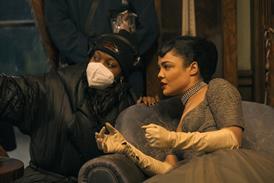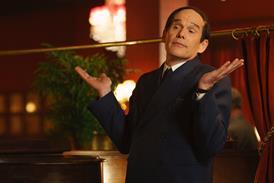Dir: Goran Paskaljevic. Serb-Monaco. 2006.94mins.
Eight years after his feature The Powder Keg portrayed Milosevic's
Inspired by Voltaire's Candide and thenotion that 'everything is for the best in the best of the possibleworlds, evidence notwithstanding', Paskaljevic attemptsto pinpoint some of the reasons that have held his part of the world back inthe past and still do to this day. Centre stage is held by Lazar Ristovski (who appeared in Paskaljevic'sprevious feature Midwinter's Night Dream),who appears in all the episodes (although in one he only features as a corpse).
Observers of Balkan cinemawill not want to miss this subversive black comedy, and Paskaljevic'sreputation promises to carry it not only along the festival circuit but alsointo specialised art house positions as well.
Starting with a flood andending in the mud, the script seems bent on flagging up certain traits that onecould argue are Balkan because of Paskaljevic's rootsand the location in which he sets TheOptimists.
But while the tales serve asa series of perfectly clear metaphors on the region's condition, in realitythey are easily adaptable - just like Voltaire's work - to anywhere else in theworld.
In one episode a hypnotist (Ristovski) tries to buoy up the spirits of villagers whosehomes have been inundated by floodwater. Instead he is wrongly accused of theftby the police, who see him as a disruptive influence. Next, a father (again Ristovski) is ready to shoot a sleazy businessman (Tihomir Arsic) who raped hisdaughter (Bojana Novakovic),but ends up profusely apologising for fear of beingfired from work.
The owner (Ristovski) of a large abattoir calls in the medicalprofessionals during a subsequent episode to treat his 12-year-old son, whosededication to the family business is such that he slaughters everything insight. Tale four follows a young man (Viktor Savic),who gambles away the money for his father's funeral, but who can only seefurther action as his means of redemption.
Finally a faith healer (Ristovski) takes a busload of unfortunates to anon-existent miracle spring that he claims will cure them of their ills, beforetrying to sneak away with their money. He is found out but then the buscontinues on its journey, for nothing can shake the belief of its duped travelersin a magic solution to their incurable diseases.
Paskaljevic almost adopts the attitude of a typical EasternEuropean mother whose son may be a fool but for who, whether she likes it ornot, he is still her son. Hope and gloom, arrogance and defeat, mystic faithand scepticism; all paradoxically manage to co-existin The Optimists at the same time.
Occasionally director and castseem too swept along by their own impetuosity and often come close tocaricature. But they also evoke several painful and deeply disturbing passages,like the moment when the father realises that notonly can he not avenge his daughter but also that he has to humiliate himselfin front of his tormentor; or the subsequent meal, when he and his entirefamily are gathered round the table without one word being spoken.
Even at its funniest, TheOptimists' macabre humor is tinged with something more than sadness anddespair: witness the episode in which the chubby 12-year-old (Lazar Milosevic)wields a knife against anything that crosses his path, in a more than chillingreminder of the recent past.
Paskaljevic plays his cast like a virtuoso, and even Ristovski, whose powerful personality often tends to sweepeverybody else off the screen, is kept under close control.
Having now racked up 14features during his three decades of feature film-making, the Serb directordisplays superb confidence in his choice of camera set-ups, particularly in thefirst episode. Smooth cinematography fits his needs to a tee, as do the artdirection and the music soundtrack.
Production companies
Nova Film
Zepter International
Swiss Effects
Wanda Vision
Zillion Film
International sales
Nova Film
Producers
Goran Paskaljevic
Madeleine and Philip Zepter
Screenplay
Valdimir Paskaljevic
Goran Paskaljevic
Cinematography
Editor
Petar Putnikovic
Production design
Tijana Maric
Music
Aleksandar Simic
Main cast
Lazar Ristovski
Petar Bozovic
Bojana Novakovic
Tihomir Arsic
Danica Ristovski
Viktor Savic
Mira Banjac
Nebojsa Glogovac
Lazar Milosevic
Nebojsa Milovanovic
Alexandra Pleskonic
Slavko Stimac

















No comments yet